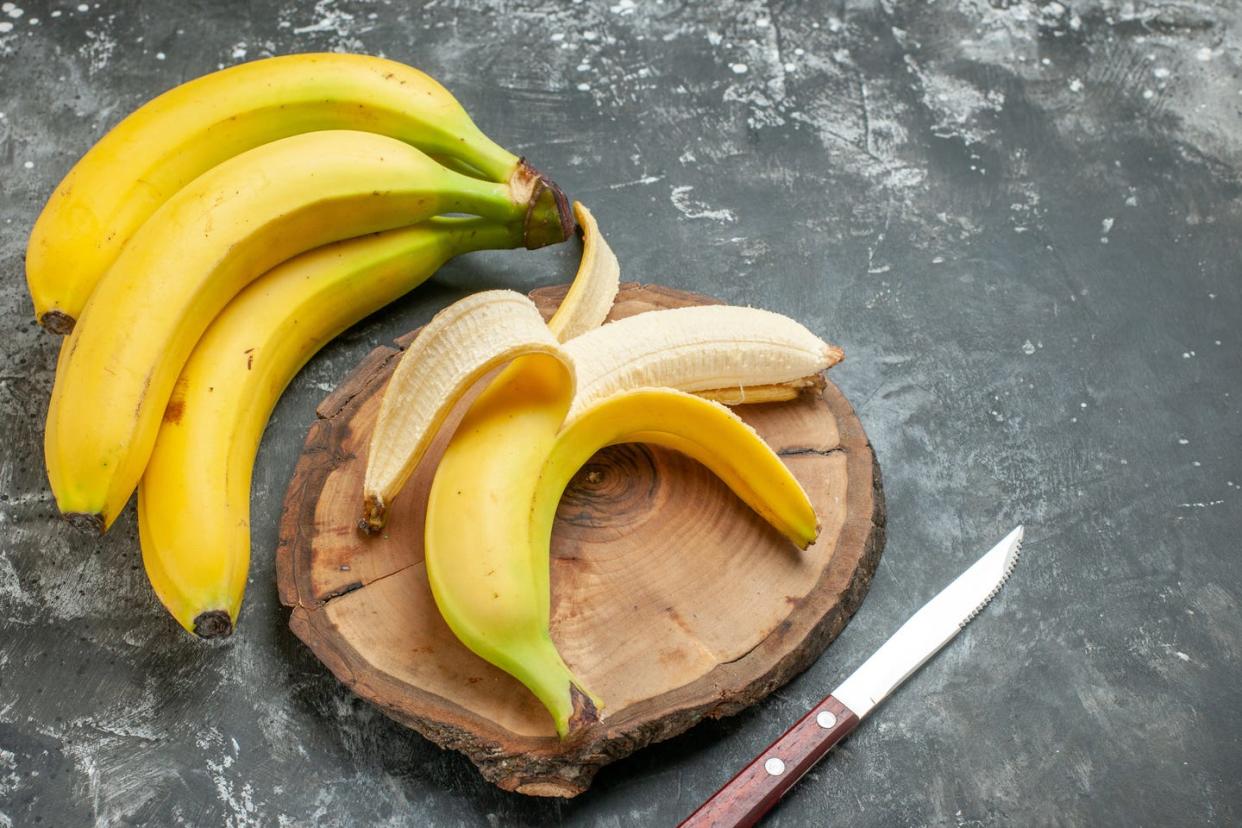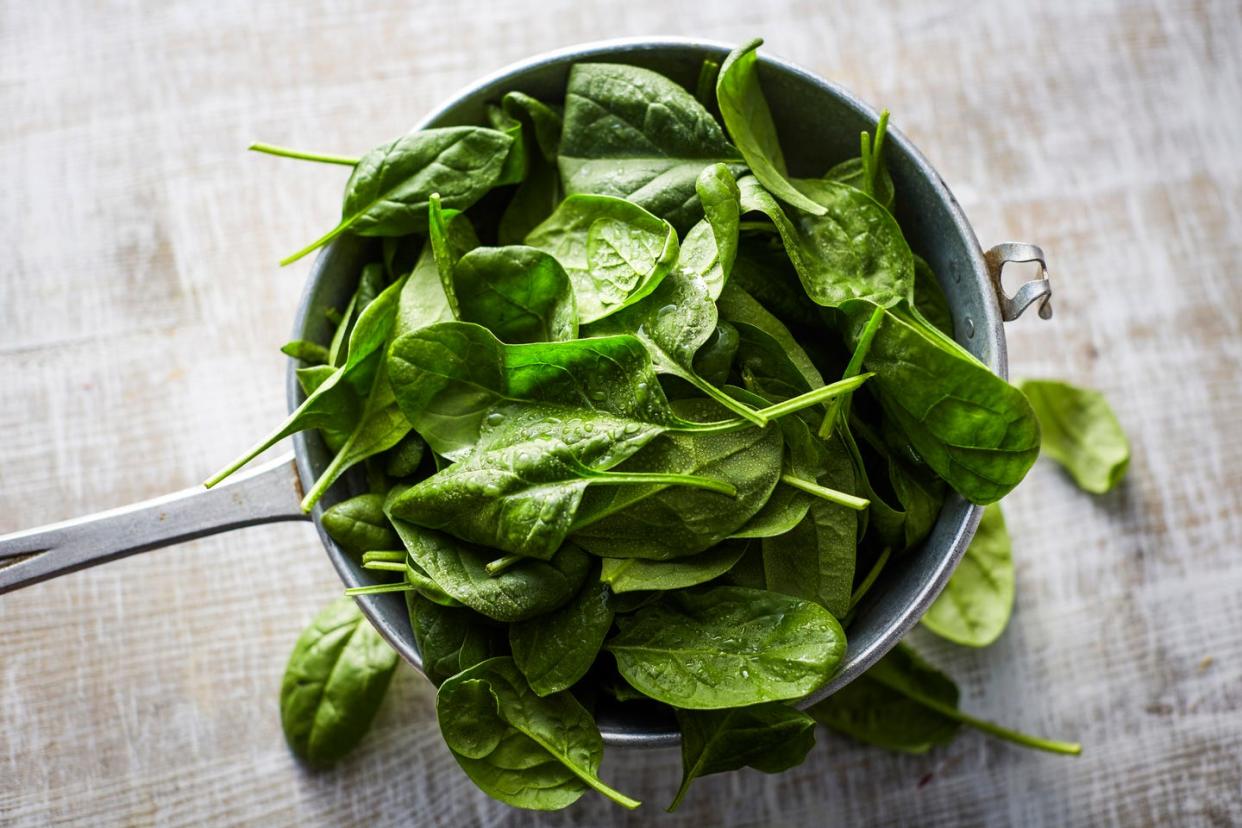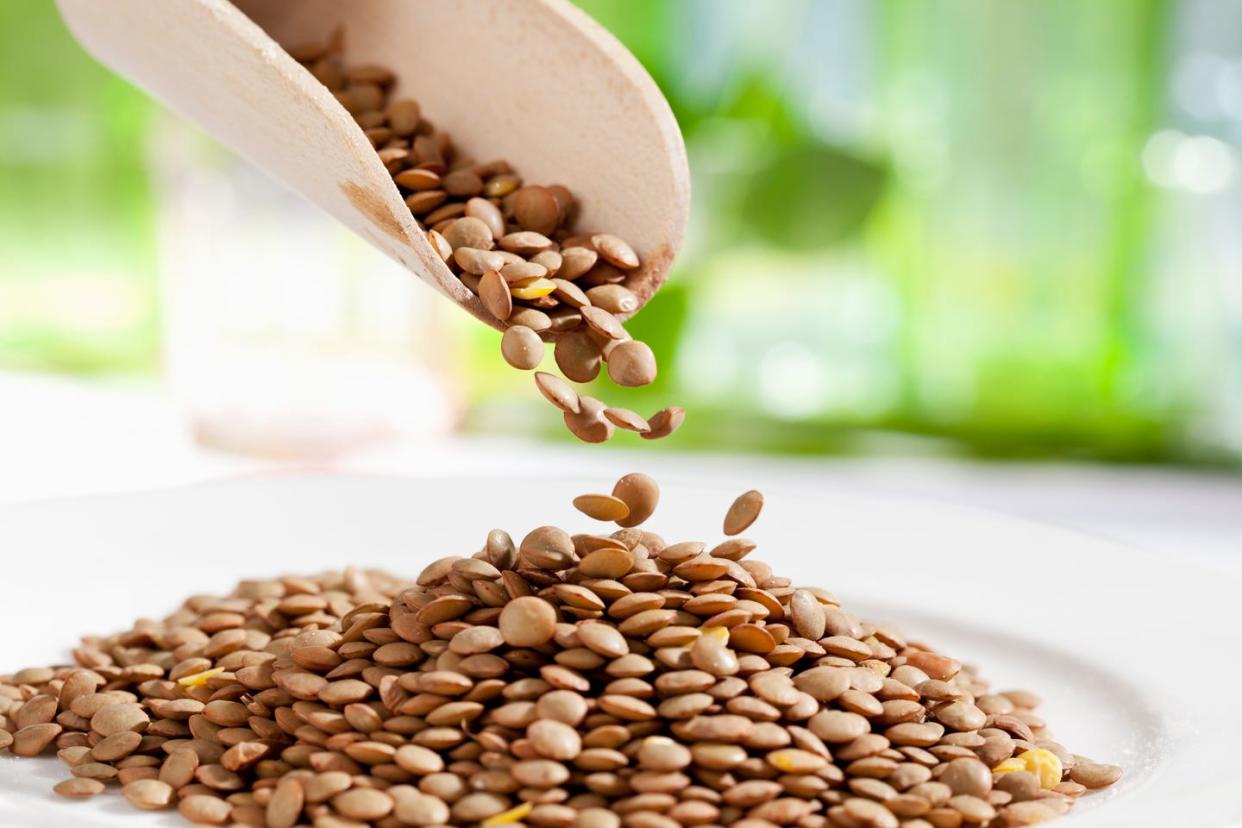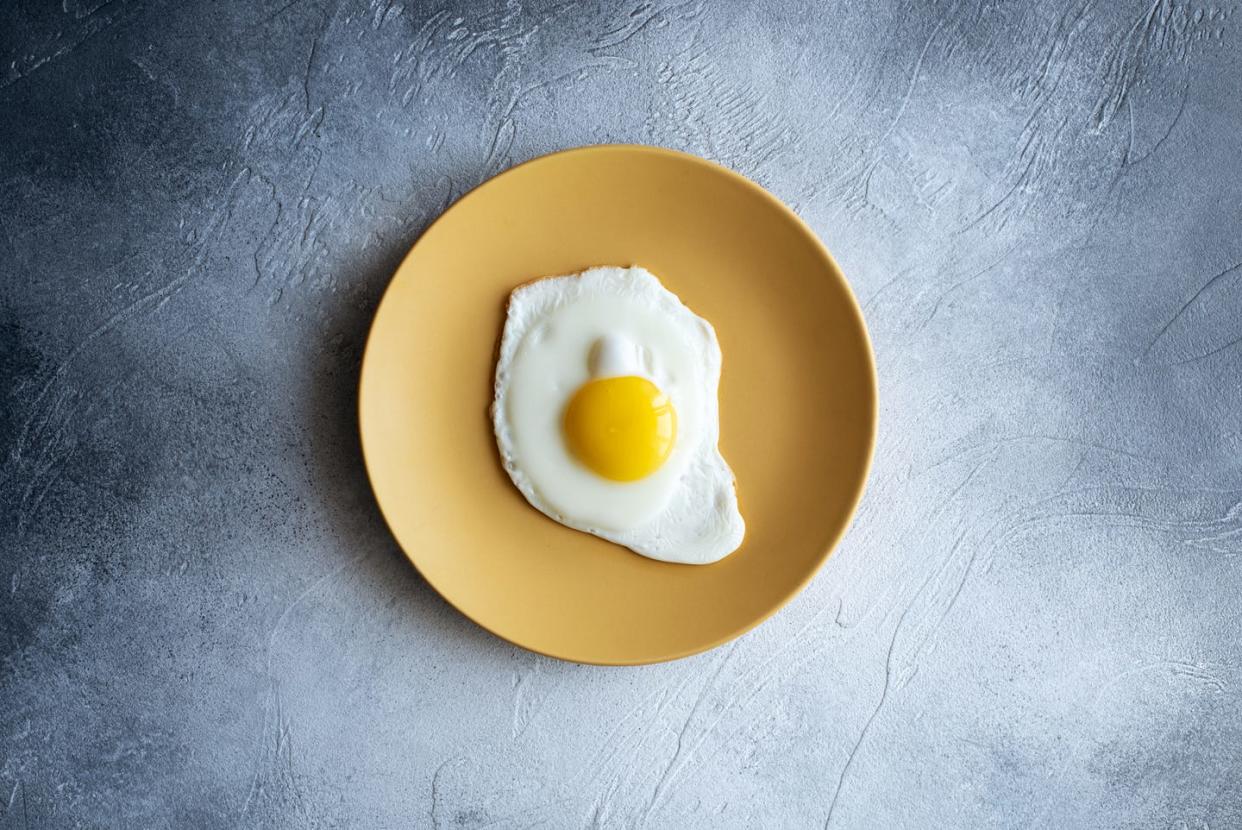15 Food That Will Boost Your Energy Instantly
"Hearst Magazines and Yahoo may earn commission or revenue on some items through these links."
It’s mid-afternoon, and here comes that all-too-familiar feeling — you're dragging, and you're also starving. Why does this always happen to you? Well the answer could (partially) lie in what makes up your meals.
“How energized we feel relates to our lifestyle routine, including how much sleep you get, whether or not we regularly exercise, our stress levels and how well we manage them, whether we're properly hydrated and, of course, the quality of our diet,” explains Dawn Jackson Blatner, RDN, CSSD, author of The Superfood Swap. “Healthy lifestyle routines help all of our body systems work better, which leads to us feeling recharged, motivated and alert.”
Translation: If you’ve been burning the candle at both ends and not taking care of yourself in general, you can expect energy drops. And while another cup o' joe or candy bar might sound like an easy fix, it's actually the last thing you need when it comes to replenishing your energy stores for the long haul.
“To boost energy, choose a snack that provides a combo of fiber and protein,” says Joy Bauer, MS, RDN, CDN. “This is the magic mix when it comes to lifting and sustaining energy, because protein and fiber help to steady our blood sugar levels, preventing energy spikes and dips.
Ready to achieve the zip that will allow you to go, go, go all day long? Our nutrition experts shared some of their top high energy foods to boost you up so you can do just that.
The Best High-Energy Foods
Peanut Butter
Creamy, nostalgic and "a great source of healthy fats, protein, and fiber, which all provide a steady and sustained release of energy,” says Blatner. “Peanut butter also contains magnesium, a mineral that plays a role in energy production." Other nut butters would also be energetic choices, so experiment with ones made from almond, sunflower seeds and more. For a quick boost, spread nut butter on whole grain toast or crackers, use it as a dip for apple slices or celery sticks, or add it to a fruit smoothie. Oh, and we won't tell if you simply savor a spoonful or two.
Sweet Potatoes
This orange tuber is an excellent source of complex carbohydrates, which take longer to digest so you're provided with a slow and steady energy release, Blatner explains. “Sweet potatoes are rich in fiber, which helps prevent blood sugar spikes and crashes to ensure steady energy levels." Additionally, sweet potatoes contain beta-carotene (a precursor to vitamin A), which is essential for cellular energy production, Blatner adds.
Add leftover sweet potato cubes to your morning omelet to help you stay full 'til lunch. Or roast or air fry sweet potato wedges or "fries" and keep them on hand for a quick snack.
Bananas
Bananas are energy superstars: They have potassium, magnesium, vitamin B, fiber, and carbs (which all contribute to energy production) in abundance. The fruits also contain three forms of natural sugar—glucose, fructose, and sucrose—and each is absorbed at a different rate, meaning you get spread-out energy on top of a right-now boost.

“This is the perfect package of simple carbohydrates, vitamins and minerals for an energy boost,” says Marisa Moore, MBA. RDN. LD., founder of Marisa Moore Nutrition in Atlanta, GA.
Edamame
“Soybeans are a great source of slow-burn carbs, plus fiber and protein,” to provide all the energy you need to keep up with your active lifestyle, says Bauer. Carbs and protein help replenish glucose in your body, which serves as your fuel, Moore adds.
You don't need to go out for sushi to enjoy this fan favorite appetizer. You can find edamame both in the shell and pre-shelled in the freezer section of many grocery stores, so keep a few bags on hand to create energizing meals and healthy snacks. You may also like roasted edamame snacks (just grab a bag without too much sodium) for a crunchy on-the-go option.
Nuts and Seeds
"Almonds, pistachios, walnuts, sunflower seeds and pumpkin seeds some of my favorite go-to energy boosters,” Moore says. “Nuts and seeds provide essentials for sustained energy: protein, healthy fats, carbs and fiber for energy. Plus, they're portable and ready whenever you need them for a pick-me-up.” DIY your own trail mix or look for snack packs that you can always throw in your desk drawer, car or purse.
Leafy Greens
Make it your goal to try 'em all! There are so many leafy greens to love. "Greens such as kale, watercress, cabbage, collard greens and arugula contain natural nitrates, which the body converts to nitric oxide, which helps deliver more energizing oxygen to our brain and muscles,” explains Blatner. Leafy greens also contain an array of vitamins and minerals that aid in energy production, such as vitamin C, B-vitamins, iron and magnesium. “Spinach in particular contains iron plus vitamin C, which helps the body absorb plant-based iron," Bauer adds.

Think beyond plain kale or romaine and mix a bunch of greens for a salad bowl base. You can also toss any greens into pasta, soups or stews, eggs to bulk up your meal and fuel you for your day.
Nutritional Yeast
A staple of predominantly plant-based diets, “nooch” adds more than just a sprinkling of cheese-like flavor. Those golden flakes are full of B vitamins, and vitamin B12 in particular is required for energy metabolism, the process of turning nutrients you consume into fuel. Nutritional yeast can be used to create non-dairy "cheese" sauces or thicken soups and stews, sprinkled on popcorn or roasted veggies or used in place of parmesan cheese in your favorite recipes.
Cottage Cheese
One cup of this oldie-turned-trendy favorite provides nearly 25g of protein, which fills you up and helps prevent energy sources like glucose from being absorbed too fast — that's how you get lasting energy and no quick crash. Cottage cheese is also an excellent source of vitamin B12, an essential for energy production, says Blatner.
If you don't think you love cottage cheese, try re-imagining it (no pineapple and cottage cheese, here!), and spread it on toast or top it with savory bits like tomatoes, basil and a drizzle of balsamic vinegar. Or if you do have a sweet tooth, try it with your favorite yogurt toppings.
Apples
For those "need energy now" moments, bite into an apple. “Apples contain natural fruit sugar called fructose, which our body can quickly turn into energy,” Blatner explains. "They also contain pectin, a type of fiber that supports gut health and may be associated with having more energy since a healthy gut will absorb more nutrients from the foods that we eat. Plus, this fruit delivers vitamin C, a nutrient that help protect the mitochondria, or energy factories of our cells, which in turn helps support overall energy production.
Berries
Whether you choose strawberries, blueberries, raspberries or blackberries, these sweet and juicy fruits contribute lot of hydrating H20 on top of vitamin C — two mainstays for energy production and lasting zip, Moore says. Strawberries may be particularly energizing, as they are especially robust in vitamin C, which studies suggest may help ward off fatigue, and they’ve got plenty of fiber thanks to all of those teeny, tiny edible seeds! Remember: fiber helps slow the digestion of energy-supplying sugar so that your levels remain steady. “I love having a handful of berries on their own as a snack or adding to a salad for a surprising burst of flavor, nutrition and color,” Moore adds.
Lentils
All sorts of beans and lentils are smart choices when it comes to supporting energy. “They provides a terrific combo of protein and fiber to balance blood sugars,” says Bauer. “And lentils are also rich in plant-based iron, a mineral that helps deliver oxygen to our cells.”

One of Blatner's favorite tricks for those who may not always think of eating beans and lentils is to open a can and dump it in a clear food storage container, then keep it in plain sight in the fridge and aim to finish it by the end of the week (bonus points if you eat more than just one weekly can!).
Citrus
When you're sick, you definitely don't feel energetic, so making sure your diet regularly contains foods that support a strong immune system can also contribute to maintaining good energy levels. “Oranges are 87% water so extremely hydrating, plus contain immune-boosting vitamin C,” Blatner says. “A healthy immune system is important for energy.”
Other vitamin C-rich picks include bell peppers of all colors, mango and kiwi.
Green tea
Green tea has moderate amount of caffeine, which is a natural energy booster and it contains a compound called L-theanine for focused, steady energy instead of jitters,” Blatner explains. The brew is also robust in antioxidants that contribute to a healthy, effective immune system. If you do need a little more caffeine but still don't want the shakes, give matcha a try. The green powder is made from green tea leaves and makes for a delicious hot or cold beverage. “Mix 1/2 to 1 teaspoon of matcha in a small mug of hot water or plant-based milk, and (optionally) a dash of your favorite sweetener," Blatner says.
Eggs
Is there a more perfect food than the humble egg? One large egg nets you about 6g energy-supporting protein, and the yolks have choline, a nutrient that supports good cognitive function (when we think clearly we may feel more alert!).

Protein and fat, which is also present in eggs, also promote satiety so that you're less likely to munch on energy-zapping quick snacks like those office cookies or vending machine chips. Keeping a batch of hardboiled eggs in the fridge is a great way to always have an energizing snack option on hand.
Water
“This seems so obvious, but many people forget,” says Bauer. “Dehydration is a common cause of fatigue. We all should aim to drink at least half our weight in water each day. So if you weigh 160 pounds, try to sip 80 ounces of H20 (sparkling and flat both count!) each day. It’s not a scientific-based rule, but rather a terrific manageable guideline.”
More FAQs
What foods decrease energy?
Just like certain foods supports your body's energy production, some foods may do the opposite and drain your battery. Minimize these foods to maintain steady energy without the crash:
Sugar-filled foods like soda, baked goods, candy
Refined grains (white bread, white rice, pretzels, etc.), plus processed foods like chips.
Fried and fatty foods
What foods are good for chronic fatigue?
If your doctor has diagnosed you with chronic fatigue syndrome, it's a good idea to ask them if there are specific foods that you should be incorporating into your diet to help with your energy levels. But in general, padding your diet with the foods listed above is a smart move to help with energy production. Remember the energy-promoting biggies: protein, fiber, healthy fats, complex carbs, B-vitamins (particularly vitamin B12) and vitamin C.
What other ways can I improve energy?
The foods that you eat play a major role in how energetic you feel, but there are other lifestyle habits that you can regularly employ to keep you energized. And bonus, they all also contribute to an overall healthy you.
Don't skip meals.
“Eating regular, appropriately sized and well-balanced meals will keep your blood sugar steady,” says Bauer. “When blood sugar takes a dive, so do energy levels.”
Make those meals balanced.
"A balanced meal is defined as whole grains or potatoes on 25% of your plate; animal or plant protein as 25% of your plate; and colorful produce with a topping of healthy fats (like olive oil) as 50% of your plate,” says Blatner.
Only eat until you’re full.
“Be mindful that overeating can leave you feeling tired, as your body works hard to metabolize the excess food,” says Moore. So take breaks between forkfuls and focus on the flavors, textures and aromas to help you slow down the pace and stay in better touch with your body's natural "I'm full now" cues.
Limit alcohol.
“Alcohol is a depressant and can also have a dehydrating effect on the body, all of which can cause you to feel tired," Moore says. “When you do have an alcoholic drink, always sip a glass of water alongside and make it a point to drink more H20 that day.
Practice self-care
Get good sleep (seven to nine hours per night is great), exercise and keep a handle on stress through mindfulness, meditation or yoga to further support steady energy.
You Might Also Like
